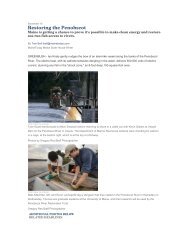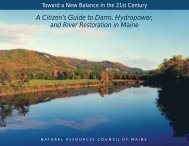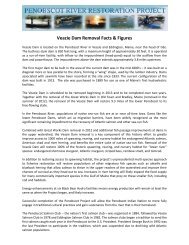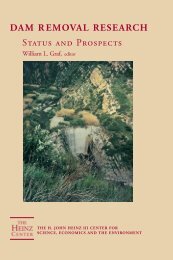Operational Plan for the Restoration of Diadromous Fishes to the ...
Operational Plan for the Restoration of Diadromous Fishes to the ...
Operational Plan for the Restoration of Diadromous Fishes to the ...
You also want an ePaper? Increase the reach of your titles
YUMPU automatically turns print PDFs into web optimized ePapers that Google loves.
27.5 Hold an interagency technical committee public meeting each year <strong>to</strong><br />
present: program results and progress, discuss potential management<br />
responses, review proposed activities <strong>for</strong> <strong>the</strong> ensuing year<br />
In order <strong>to</strong> in<strong>for</strong>m stakeholders <strong>of</strong> <strong>the</strong> progress <strong>to</strong>wards goals <strong>for</strong> <strong>the</strong> watershed and<br />
<strong>to</strong> update interested parties on <strong>the</strong> activities <strong>of</strong> MDMR, IFW and o<strong>the</strong>rs working in<br />
<strong>the</strong> watershed, <strong>the</strong> ITC will host an annual meeting <strong>to</strong> keep a dialogue going with<br />
stakeholders. This is envisioned <strong>to</strong> have both a technical presentation component<br />
and a feedback session.<br />
27.6. Develop new and enhance existing partnerships with stakeholders,<br />
which maximize resources available <strong>for</strong> achieving program objectives<br />
There are multiple stakeholders in <strong>the</strong> drainage. Many are traditional watershed<br />
groups that are currently involved <strong>to</strong> some extent in res<strong>to</strong>ration. MDMR will work <strong>to</strong><br />
enhance <strong>the</strong>se partnerships when possible. There are o<strong>the</strong>r non-traditional groups<br />
that MDMR will work <strong>to</strong>wards including <strong>the</strong> process in order <strong>to</strong> achieve <strong>the</strong> desired<br />
results.<br />
27.7. Continue <strong>to</strong> encourage communication and in<strong>for</strong>mation exchange with<br />
those agencies, regula<strong>to</strong>ry bodies, and organizations having related<br />
jurisdictional interests and responsibilities<br />
Closely tied <strong>to</strong> tasks 29.5 and 29.6 <strong>to</strong> improve communication among government<br />
groups and improve regula<strong>to</strong>ry and management policies.<br />
28.1. Participate in regional fisheries management and assessment ef<strong>for</strong>ts at<br />
both administrative and scientific levels<br />
The State <strong>of</strong> Maine participates in several inter-jurisdictional ef<strong>for</strong>ts including <strong>the</strong><br />
Atlantic Coastal Fish Habitat Partnership, <strong>the</strong> New England Joint Venture, <strong>the</strong><br />
Atlantic States Marine Fisheries Commission, <strong>the</strong> US Atlantic Salmon Assessment<br />
Committee, <strong>the</strong> Eastern Brook Trout Joint Venture, <strong>the</strong> New England Fish<br />
Administra<strong>to</strong>rs, and <strong>the</strong> New England Atlantic Salmon Coalition.<br />
28.2. Participate in international management and assessment ef<strong>for</strong>ts such as<br />
<strong>the</strong> North Atlantic Salmon Conservation Organization and <strong>the</strong> International<br />
Council <strong>for</strong> <strong>the</strong> Exploration <strong>of</strong> <strong>the</strong> Seas.<br />
The U.S. became a charter member <strong>of</strong> <strong>the</strong> NASCO in 1984. NASCO is charged with<br />
<strong>the</strong> international management <strong>of</strong> Atlantic salmon s<strong>to</strong>cks on <strong>the</strong> high seas. Three<br />
Commissioners <strong>for</strong> <strong>the</strong> U.S. are appointed by <strong>the</strong> President and work under <strong>the</strong><br />
auspices <strong>of</strong> <strong>the</strong> U.S. State Department. One <strong>of</strong> <strong>the</strong> Commissioners is from Maine.<br />
The International Council <strong>for</strong> <strong>the</strong> Exploration <strong>of</strong> <strong>the</strong> Seas (ICES), <strong>the</strong> <strong>of</strong>ficial research<br />
arm <strong>of</strong> NASCO, convenes a Working Group on North Atlantic Salmon which is<br />
responsible <strong>for</strong> providing scientific advice <strong>to</strong> be used by NASCO members as a<br />
basis <strong>for</strong> <strong>for</strong>mulating biologically sound management recommendations <strong>for</strong> <strong>the</strong><br />
conservation <strong>of</strong> North Atlantic salmon s<strong>to</strong>cks. The Working Group on North Atlantic<br />
Salmon, which is composed <strong>of</strong> representatives <strong>of</strong> member countries, including one<br />
Maine biologist and as many as three from <strong>the</strong> US, is responsible <strong>for</strong> <strong>the</strong> collecting<br />
and analyzing scientific data on salmon.<br />
PRFP Page 111






